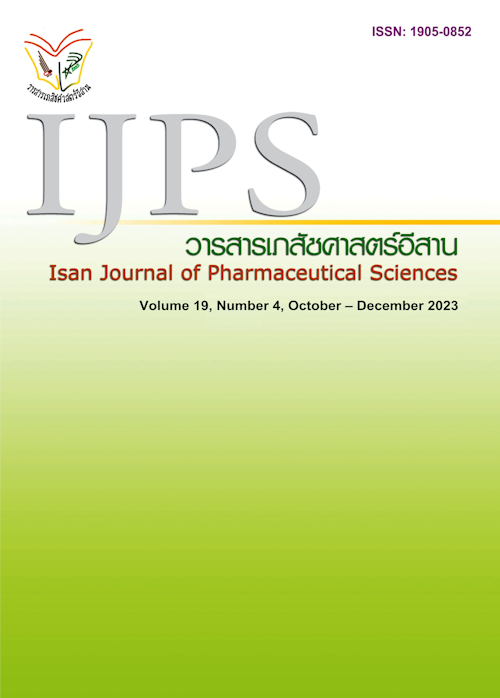The effect of Computerized Clinical Decision Support System on prescribing NSAIDs in patients with stage 3 to 5 Chronic Kidney Disease at a community hospital
Main Article Content
Abstract
Chronic kidney disease It is a major public health problem worldwide. In Thailand, it is an urgent problem that arises both in hospitals and communities. One measure to address the problem is Promoting rational drug use. Which aims for medical personnel and service recipients to change drug behavior. Objective : 1) To study the efficacy of a multidisciplinary pop-up alert system in recognizing the effect of the drug on the level of renal failure in patients; 2) To assess the factors important to the prescribing of Non-Steroidal Anti-Inflammatory Drugs(NSAIDs). Quantitative and qualitative analysis of chronic kidney disease patients in both Inpatients and Outpatients through the HOSxP system of a community hospital. From the study of the effect of using the Computerized Clinical Disease Support System. (CCDSS) A case of NSAIDs and stage 3-5 renal failure patients in a community hospital Method: Descriptive research model By collecting data from the hospital database, collecting data from 2015-2020 in a sample of 248 patients and Focus Group among 5 doctors. Results: Factors affecting the prescribing of NSAIDs in chronic renal failure stage 3-5 patients were: severity stage 3-5, Age of the patient, Prescribing NSAIDs of the Inpatients with the frequency of prescribing NSAIDs, it was found that after the noctification system, the frequency of prescribing NSAIDs in the Inpatient ward decreased from 32.37% to 3.37% with statistical significance. p-value<0.001(OR=5.8124 95%CI 2.8771 - 11.7426 p-value<0.001). The assessment of the notification system had high important factors, ie age 66-77 years and Inpatients with statistically significant p-value <0.001. In-depth interview. Physicians are aware of the prescribing of NSAIDs in stage 3-5 renal failure patients. Conclusion: The results of this study show that NSAIDs use in stage 3-5 patients with chronic renal failure via Pop -up has the effect of reducing drug prescribing effectively For Inpatients and the elderly, it is an important factor affecting the evaluation of prescribing.
Article Details

This work is licensed under a Creative Commons Attribution-NonCommercial-NoDerivatives 4.0 International License.
In the case that some parts are used by others The author must Confirm that obtaining permission to use some of the original authors. And must attach evidence That the permission has been included
References
Atipol Klaypaksi. Effect of Computerized Clinical Disease Support System on Medication Use in Patients with Renal Impairment. Thai Journal of Pharmacy Practice Vol.12 2020; No.2. : 437 - 451.
Backman R et al., Clinical reminder alert fatigue in healthcare:a systematic literature review protocol using qualitative evidence. Systematic Reviews. 2017; 6:255. DOI 10.1186/s13643-017-0627-z
Chayakul C, Jongtrakun P et al., Rational Drug Use Hospital Manual. 1st ed. Bangkok. The Agricultural Cooperative Federation of Thailand, Limited. 2015
Desmedt et al., Impact of a clinical decision support system for drug dosage in patients with renal failure. International Journal of Clinical Pharmacy. 2018
Field et al., Computerized Clinical Decision Support During Medication Ordering for Long-term Care Residents with Renal Insufficiency. J Am Med Inform Assoc. 2009;16:480 – 485. DOI 10.1197/jamia.M2981.
Gorge C et al., Chronic kidney disease in low-income to middle-income countries: the case for increased screening. BMJ glob Health. 2017
Hospital project implementation guide to promote rational use of medicine Agricultural Cooperative Association of Thailand Printing House. 2015 Nonthaburi. :75-78.
Ingsathit A et al., Prevalence and risk factors of chronic kidney disease in the Thai adult population: Thai SEEK study. Nephrol Dial Transplant. 2010.;25:1567-75.
Ingsatit A et al., A Study of Disease Process and Clinical Symptoms of Chronic Kidney Disease in Thai Populations. research report Health Systems Research Institute. 2016
Keith DS, Nichols GA, Gullion CM, Brown J, Smith DH. Longitudinal follow-up and outcomes among a population with chronic kidney disease in a large managed care organization. Arch Intern Med. 2004;164:659-63.
Koncicki et al., Pain management in CKD: a guide for nephrology providers. Am J Kidney Dis. 2017;69:451-60.
Nikom Thanomsiang. Multiple Regression Analysis. 2021 [internet]. [cited 2022 October 31]. Available from: https://home.kku.ac.th/nikom/516701-Multiple-regression-2564-occ-1.pdf
Nikom Thanomsiang. Relative Risk & Odds Ratio. 2015 [internet]. [cited 2022 October 31]. Available from: https://home.kku.ac.th/nikom/or_rr_nk2558.pdf
Nipada Vorapo. Factors Affecting Preventive Behaviors In Preventing Diabetic Kidney Disease Of Diabetic Patients In Thapthan District, uthaitani Province. Thesis M.P.H. in Public Health Program, Naresuan University, 2020
O’Hare et al., Age Affects Outcomes in Chronic Kidney Disease. J Am Soc Nephrol :2007;18: 2758 –2765,
Prasert V et al., Software Implementation for screening risk drugs for elderly in Thai Hospitals. Department of Public Health and Epidemiology, Meiji Pharmaceutical University, Tokyo, Japan. 2018
Putthasri W et al., Promoting hospitals to promote rational use of medicines Hospitals all over Thailand use cost-effective, safe, non-duplicating drugs. Health System Research Institute. Thailand; 2017
Saengpeng A et al., Development of Dosage Adjustment System for In-patients with Renal Impairment at Prasat Hospital, Surin Province. Thai Journal of Pharmacy Practice Vol.9 2017 :No. 1 : 280 - 291.
Such Díaz A et al., Drug prescribing in patients with renal impairment optimized by a computer-based, semi-automated system. International Journal of Clinical Pharmacy. 2013
Terrell et al., Computerized Decision Support for Medication Dosing in Renal Insufficiency: A Randomized, Controlled Trial. Annals of Emergency Medicine. 2010; Volume 56, Issue 62010, Pages 623-629.e2
Thanakijjaru P et al., Chronic Kidney Disease, Thai Medicine. 2011-2014. 2014
Weingart SN et al., An Empirical Model to Estimate the Potential Impact of Medication Safety Alerts on Patient Safety, Health Care Utilization, and Cost in Ambulatory Care. Arch Intern Med. 2009;169(16):1465-1473. doi:10.1001/archinternmed.2009.252


